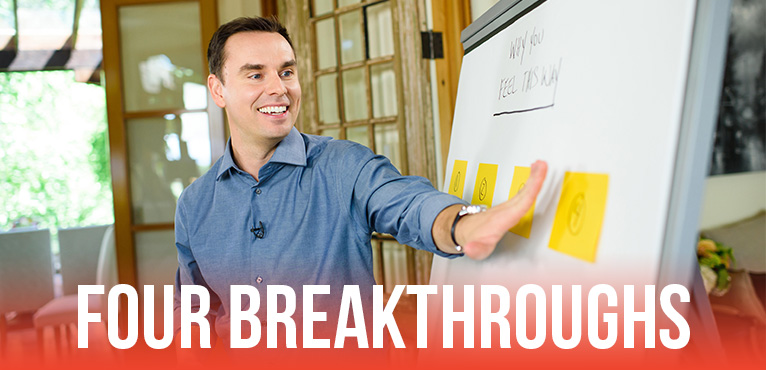SUMMARY
- “It’s hard to flow with the moments of life if you’re carrying all this hurt, all this pain, or all this stress.”
- Do you have a release routine in your life? In this episode, learn how to create the right one for yourself so you can relieve stress and tension when they come!
- “The moments that matter are the moments we’re connecting with other people by leading, serving, contributing, and dealing with the hardships of life.”
- If your stress is exhausting you, it’s time to follow these 4 tips to develop a routine that helps you decompress so you can find your flow again!
- Watch the video to get the full training.
- Already have the High Performance Planner and CRUSHING each and every day? Let’s celebrate you! Take a photo with your planner and use #HPXlife or #TeamHPX.
HOT NEWS & DEALS!
-
Join the Entrepreneur’s Challenge!
Sign up for my 7-day crash course and you’ll learn the strategies, tools, and revenue drivers needed to start (or scale) your dream business! Click here to sign up!
-
Get the High Performance System!
If you want to level up personally and professionally, High Performance System is the resource you need. The High Performance System will guide you through developing and implementing the 6 science-backed habits that will move the needle from ordinary to extraordinary. Develop the habits that lead to long-term success, positive relationships, and healthy well-being! Get the High Performance System!
DID YOU KNOW?
I give weekly prizes, gratitude and shout-outs to our students, so post a screenshot or video on Instagram and use #TheBrendonShow! I can’t wait to hear your thoughts about this episode!
RELATED POSTS
How to Deal with Physical, Mental, and Emotional Burnout
Add These Anti-Stress Tactics to Your Routine
Why You’re So Stressed (And What You Can Do About It)
How to Deal with Stressful Situations, Proactively!
How to Build Resilience in Tough Times


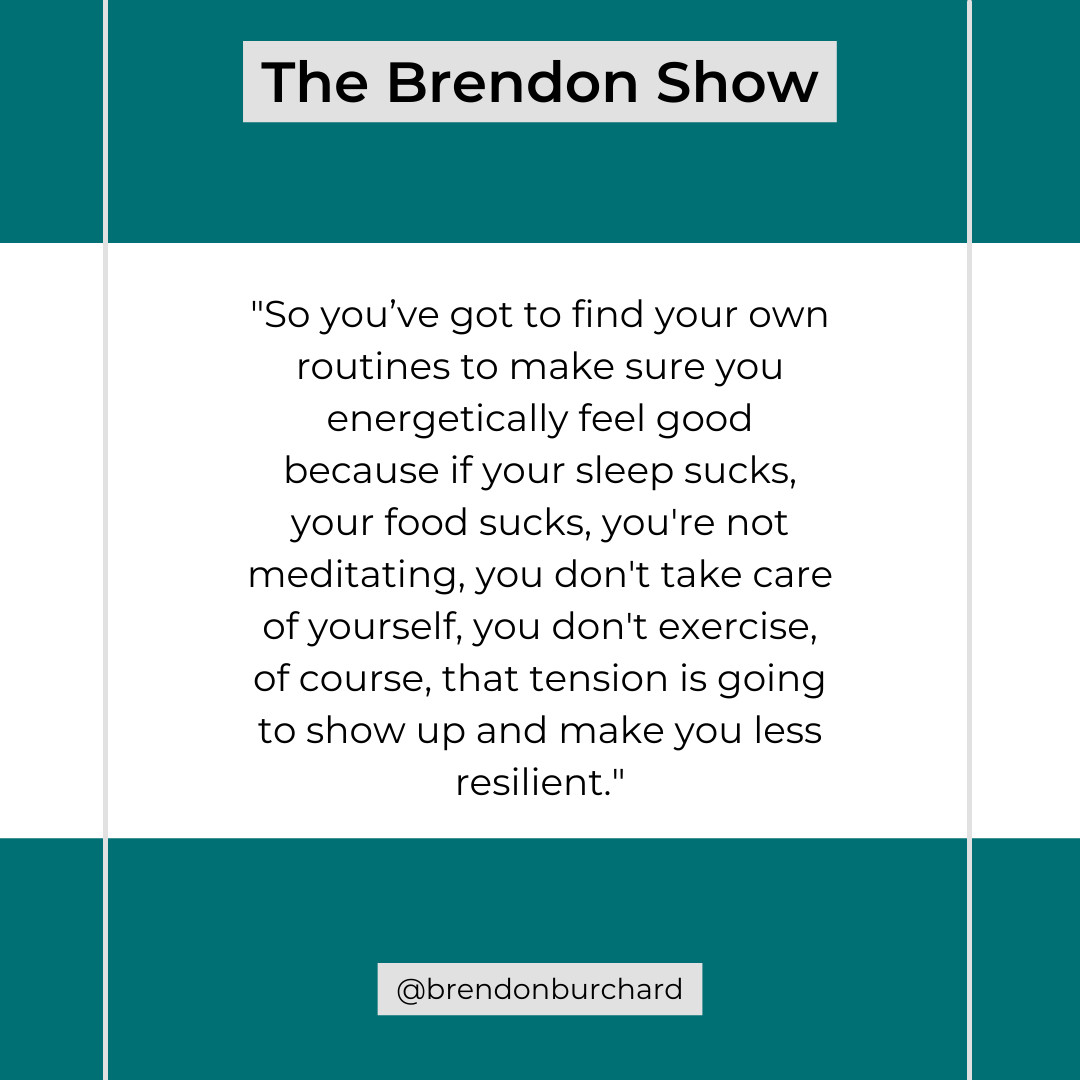
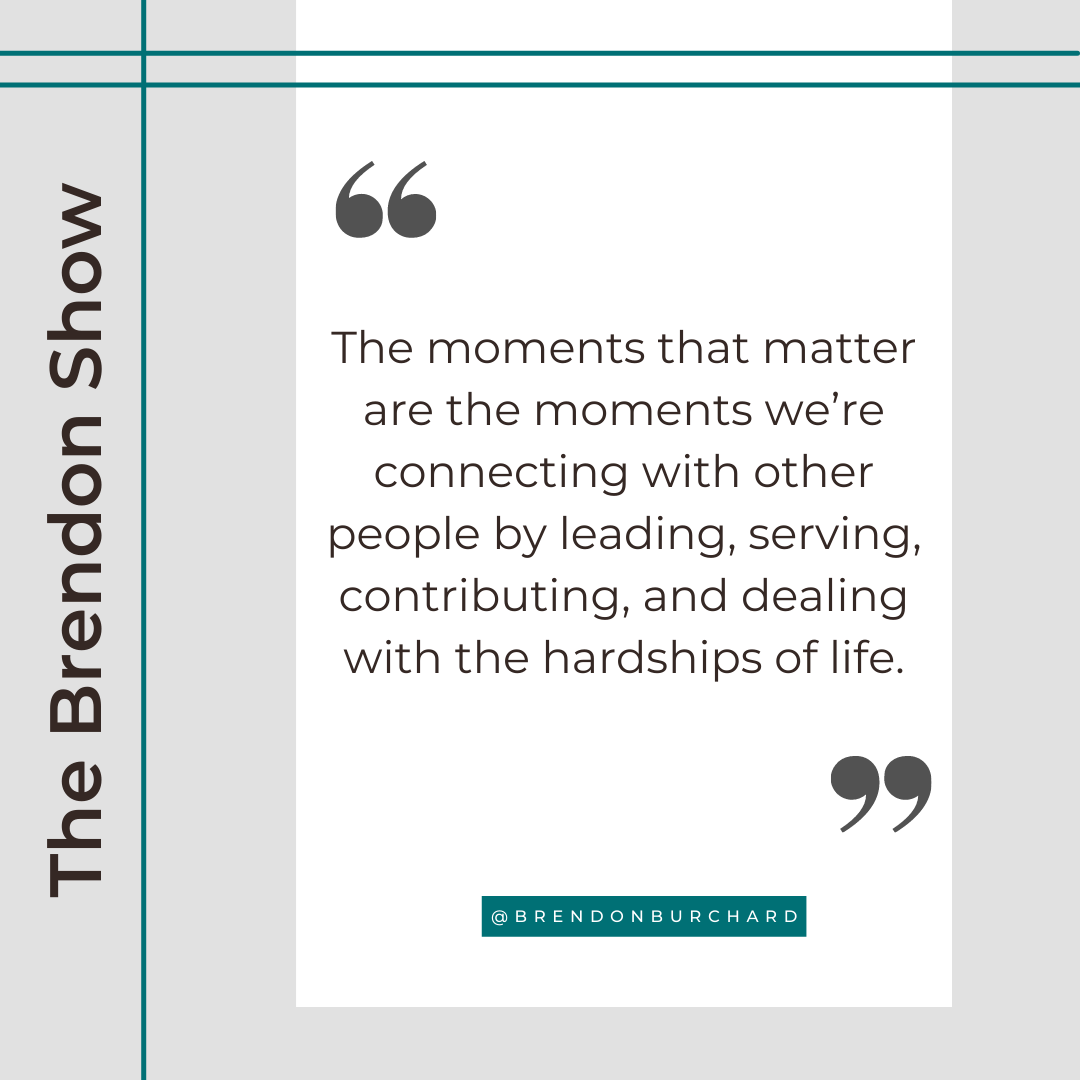
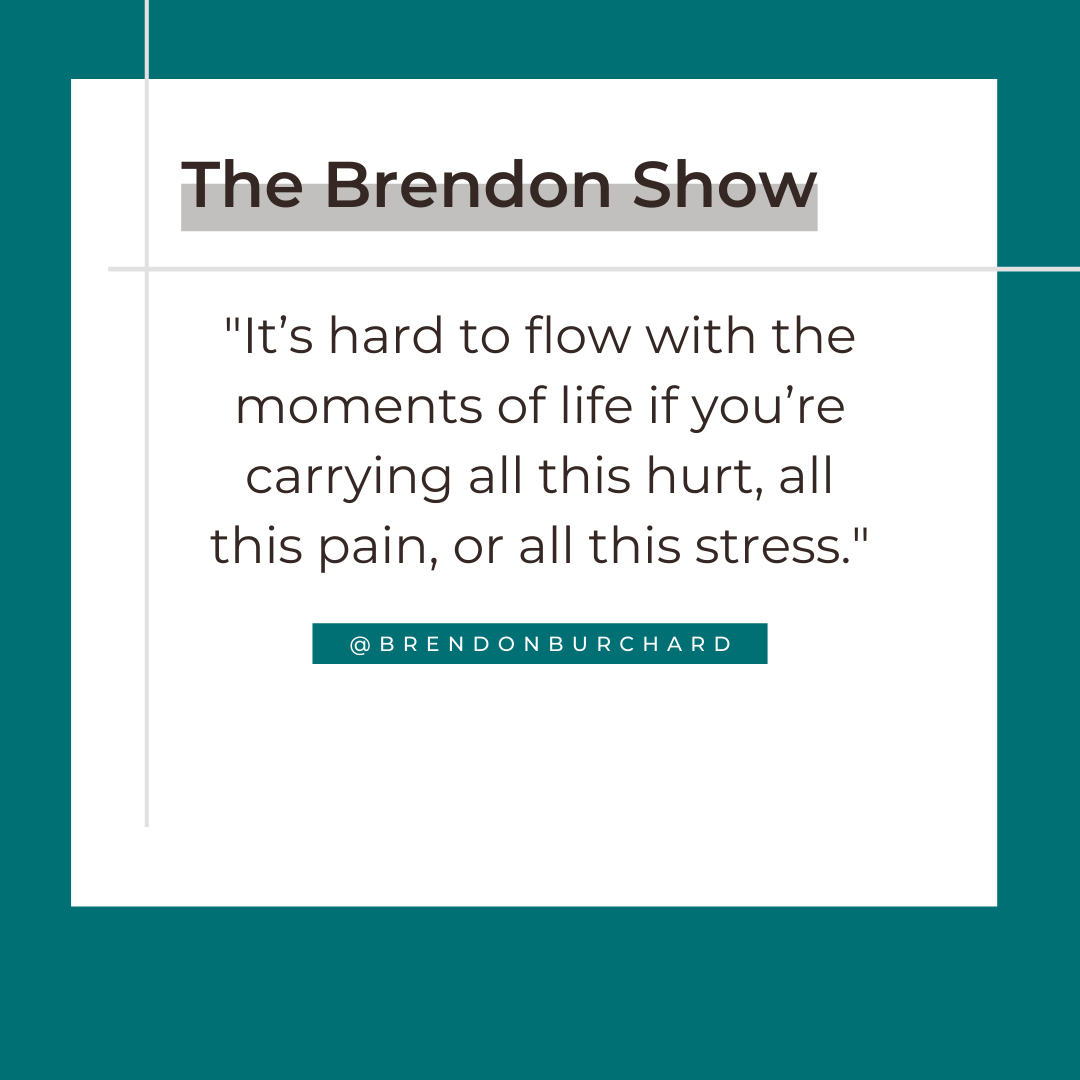
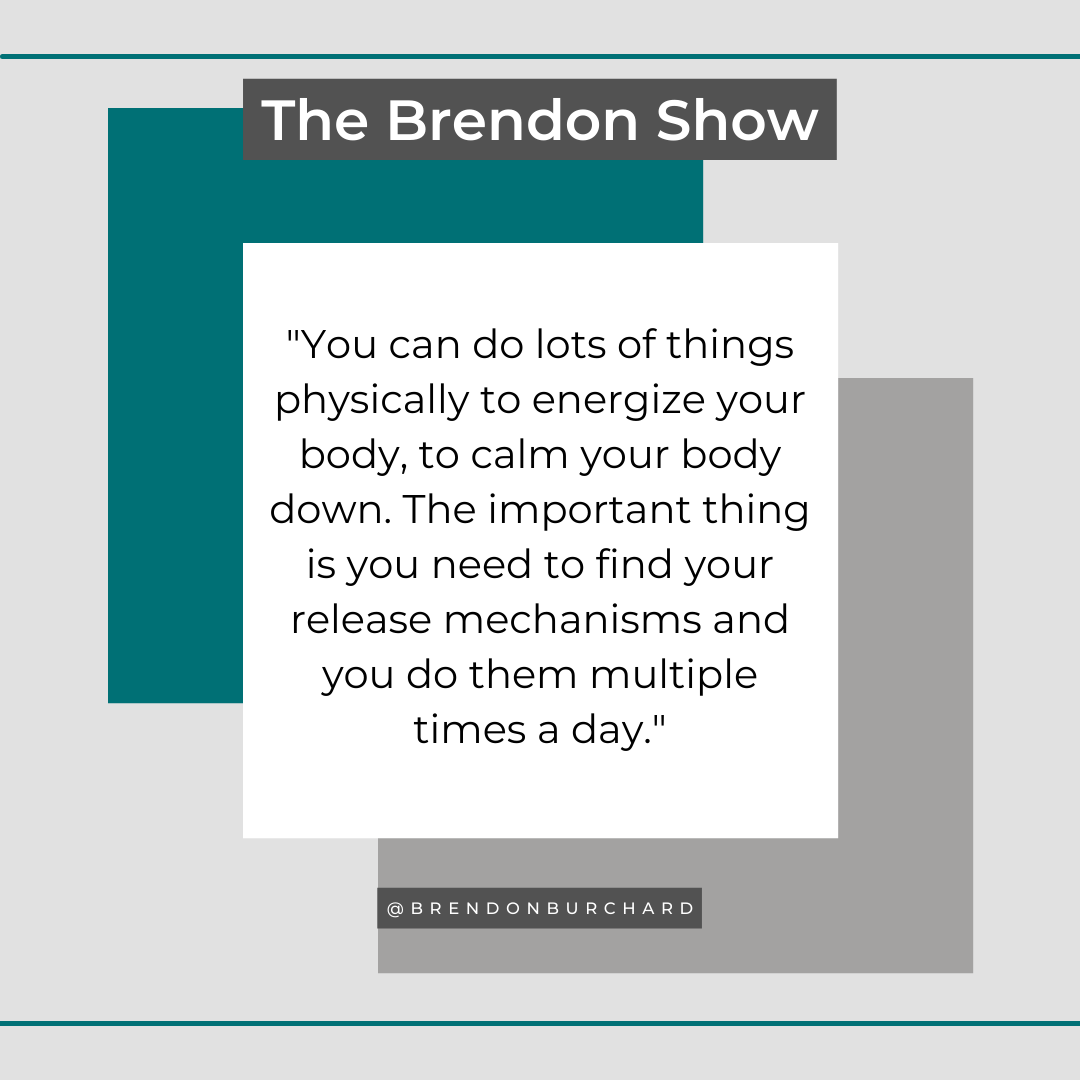
FULL TRANSCRIPT
[The following is the full transcript of this episode of The Brendon Show. Please note that this episode, like all TBS episodes, features Brendon speaking extemporaneously–he is unscripted and unedited. Filmed in one take, The Brendon Show has become one of the most viewed unscripted, direct-to-camera self-help series in the history of YouTube. It has also been the #1 Podcast in all of iTunes and is regularly in the top podcasts in Self-Help and Health categories around the globe. Subscribe to the free motivational podcast on iTunes or Stitcher.)
My greatest teaching on this topic I would just kind of summarize as the need to have release mechanisms or what I usually call a release routine in your life. What happens is when you are stressed energetically, closed down, and then a challenge comes up you respond to it worse or differently than you would if you were energized, healthy, buoyant, positive.
You’ve all had a bad night of sleep, right? If you have a bad night of sleep you know how you can be a grouch the next day. You know that you have this big project due but you’re tired so you don’t even work on it. That when you are mentally, emotionally, spiritually fatigued, or overladen with stress and overwhelm because of the way your mind is working, what do you do? Well, you perform worse. This was the stunning thing about high performers, is that their performance is so high—not because they have less responsibilities than people. In fact, usually they have way more, sometimes four to five times as many responsibilities, nodes in their network, or obligations every week. So what are they, super human in handling it? No, they’re just better at decompressing as they go.
Some people, they’re building and building and building, stress, stress, stress, so a negative event hits them and they just implode because they haven’t been releasing the tension to be able to show up free in that moment, to be able to show up and flow with that moment.
It’s hard to flow with the moments of life if you’re carrying all this hurt, all this pain, or all this stress.
So how can we do something tactical? That’s what I mean by having release routines. When you can learn to release the tension and the stress in your life on an ongoing basis, you’re more free and loose and in flow and in motion when that difficulty hits. That’s key if you ever work with world-class athletes. They will train and train and train only so that in the moment of the race they’re loose and totally natural and going with the flow and running an easy pattern. All of that grit and hard training work is to find the flow in the moments that matter.
Well in our life, the moments that matter are the moments we’re connecting with other people by leading, serving, contributing, and dealing with the hardships of life.
So what are we going to do? Well, we have to have our own routines of releasing that tension.
1. Practice Meditation Technique
So for those of you who know my release meditation technique, that’s so important for me as an example. Every day, usually once or twice a day, I just do the release meditation technique where I close my eyes, I try to release the thoughts, I try to release the tension in my body, and I just repeat the word as my mantra. My meditation mantra release, like release release release… And I’ll just do that 5, 10, 15, 20 minutes once or twice a day just to release my thoughts.
And the truth is the first three or four minutes, my mind is all over the place. And then that last few minutes or that next 10 minutes, my mind kind of lets go of everything and I find this open field. I’m still focused on the mantra of release but now I’m in a whole different headspace if you will. So I’m in a different place and that’s real power. That’s real power. So what are your routines?
2. Take Physical Breaks
Many of you know every hour, I stand up and get away from the computer and often close my eyes. I’ll bounce in place, take ten deep breaths just to get the tension out of my neck, just to get some breath back in my body, to take the tension off my eyes.
When I do that, I’m more energized, I’m more capable throughout the day of focusing and doing my work. Showing up, released. Sometimes before I leave this room and I go into my house over there, I have to make sure I release that tension because if I carry it into the kitchen or house, Denise is not going to like that.
So I’ve got to learn to let that tension go, which I struggle with. It’s hard. So I have to have a routine for that. There’s all those things that we can do in self-soothing that we don’t even know helps us feel better in the moment. I don’t know where you’re watching this but maybe try something with me. Stand up real fast and I’ll teach you just a simple stress relief technique and see how differently you feel in a few minutes.
3. Use Stress-Relief Techniques
Okay, see how different you feel just all of a sudden? You’re lighter, you feel better. I’m going to show you a simple stress relief, self-soothing technique. Nothing fancy. You’ll be like, “Oh my gosh! That’s incredible!” So if you can stand up.
I’ve already told you some of my favorite ones I like to do. I like to bounce in place, close my eyes, take 10 deep breaths. I do that every day. Another simple thing that you can do though, is because some people really need to activate physiology in a
different way, is what I’m going to have you do is I’m just going to have you put your
hand right on the back of your head. Okay, take a nice, deep breath in and then we have you take pressure and just pull down, pushing in down to your collarbone. It’s all we’re going to do. Put your hand on the back of your head. You’re going to put some pressure on, pull down, keep pressure, pressure, pressure, pressure all the way down.
Okay, I just want you to do that. Close your eyes and just do this five times with me, okay? You’re just going to close your eyes, take a nice deep breath in and a nice deep breath out. Okay breathe in, breathe out. Breathe in, breathe out. Breathe in, breathe out. One more time. Breathe in, breathe out.
Okay, now maybe you stand and bounce in place. Take three deep breaths. Good. Now just see how you feel. Might be very simple because we only did five breaths but now you might notice in the next two or three minutes you feel different. You might even feel a rush here. You might see I’ll turn red because I put pressure there. I feel a little bit of rush and a little bit of relief of the tension in my neck and my head. Keep breathing otherwise you’ll pass out! So I should mention that. Keep breathing, but you’ll notice all of a sudden like, “Oh yeah I feel a little lighter.”
That’s just a self-soothing technique.
You can do lots of things physically to energize your body, to calm your body down. The important thing is you need to find your release mechanisms and you do them multiple times a day.
4. Release Tension Multiple Times a Day
By releasing my tension with meditation, by bouncing in place, by taking ten deep breaths, by closing my eyes, by self-soothing the tension that we all carry here so much, now just releasing that, I’m like wow!
If you follow me around my house four or five times a day, I drop down to the mat
and I just do a little vinyasa flow to open up the body because so much of mental resilience comes from physical release, physical freedom.
So you’ve got to find your own routines to make sure you energetically feel good because if your sleep sucks, your food sucks, you’re not meditating, you don’t take care of yourself, you don’t exercise, of course that tension is going to show up and make you less resilient.
It’s going to make you more frustrated, more irritable, and I wouldn’t say fatigued, frustrated, and irritable is going to help you become resilient in the difficult moments of life.
Because remember, my friends. Listen, if you’ve followed me for a while in high
performance, you know this. You’re always training. You are always training. I am always concerned. I’m like, you know what? I’m in training, because I don’t know what the world’s going to throw at me but I’m training for it. I’m training my communication skills, I’m training my physical body, I’m training my mindset. Not because it’s hard right now or it’s terrible right now, but in case that stuff hits the fan, I’m tuned up and ready to go.
I think that’s an important concept in resilience. Preparation, having those release routines so you’re light, adaptable, free, open.
